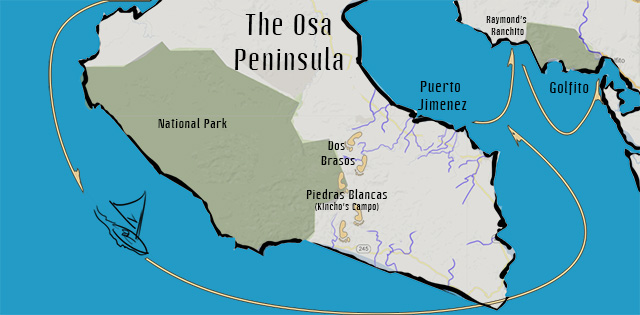
For decades both tourism and gold mining have flourished in the paradise called Corcovado National Park. People swarm from around the globe to drink smoothies, commune with dolphins, pan for gold, and pop dynamite. There's more animal and plant species represented in this place than anywhere else on the planet and so there's quite a few species of eco- represented here, too. There's eco-tours, eco-lodges, eco-dives, eco-massages, eco-snacks, eco-drinks, eco-yoga, eco-packaging and eco-marketing. It's all Gringo stuff; American, Canadian, and European.
But among all the Gringo tourists and expats that have set up camp in paradise are the gold miners, loggers, ranchers, and hunters that have been digging, shooting, shouting, rustling cattle, and drinking guaro since the early 1800s. Most of them were born here. They're poor, uneducated, and can't get a piece of the eco-fancy. They don't give a shit about some wild pig with white lips if they're hungry. They're Osa Ticos; the locals that were born deep in the Osa jungle, who grew up here, and who were here before the eco-party began. They're called campesiños.
Simply put, eco-Gringos and campesiños don't get along too well. It's a cultural incompatibility. In the last few years a few people have been killed, some folks were disappeared, and the peninsula's shudders are a weak signal for a cultural shake-up that's just starting throughout the eco-tourism world.
We went to paradise to find out why the manna of paradise was going sour.
PART ONE: MISDEMEANORS WITH A GOLD MINER.
By the time we'd anchored in Puerto Jimenez (we being myself, my wife Amélie, and our 18-month old son, Zephyr) we'd already heard rumors of the problems between the miners and the national Parks.
Back in the 1950s Costa Rican gold miners were mostly just foreign criminals that had swarmed in to suck the gold from the hillsides. These get-rich-quick madmen would hike for days, live off bananas, build rickety old wooden cabinets, hunt wild pig, grind rice, carry buckets of stream water, light campfires, and Bar-B-Q every kind of animal you can think of, from cane toads to tapirs to coatls. But of course, even panning for gold gets boring. By the 1970s the common night-time remedy for boredom was to snuff up rails of cocaine, smoke cigarettes, down guaro (a local sugar cane rot-gut) and shoot .38s into the darkness. It's a way to spend a boring Saturday night in the jungle.
We wanted a break from the boredom of the coastal Gringo enclaves, ourselves, so one Friday morning we hop into a collectivo, a minivan that will take us up into the mountains. It stinks of piss and Coca-Cola. I have to squish into the seat next to a bristly hog of a woman, Amelie and Zephyr are crushed between her kids, and some small, gnarly fellow with a blue ballcap and sunglasses sits quietly in the back seat. We roll out of Jimenez, up into the hills, and after about an hour of bouncing we stop and the doors open. We spill out of the hot bus, gasping for fresh air, but taking a breath in this tropical climate is like inhaling warm gelatin. We've arrived in the mining town of Dos Brasos.
We're totally lost. Behind us is the bridge, the chuckling river, and a lone general store. Ahead of us is a dusty road, leopard-spotted white with river rocks, curving into dense jungles of palm fronds and enormous crumples of thick vegetable matter. It's prehistoric. Up the hill we hear parrots cackling like two drunk grandmothers. A dog barks.
We don't know anyone, so we decide to solve that. My three rules of travel are Get Lost, Talk With Strangers, Keep Your Shit Together. We were lost and had our shit together, but up ahead is the gnarly guy with the blue ballcap. So I walk up to Mr. Gnarly and stick my hand out.
I introduce myself and shake his hand and notice that the skin of his palms are rough enough to light a match. He says he's a gold miner, an orero, originally from San Jose, who'd spent the last four decades digging in the rivers of the Osa. He introduces himself as Kincho.
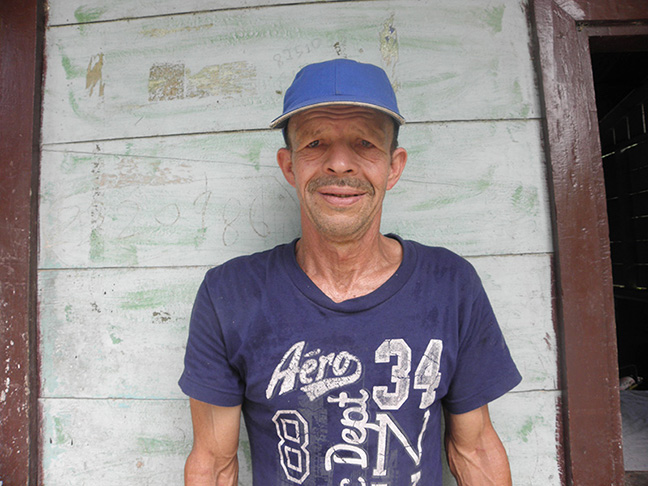
“I'm walking in to my camp tomorrow,” he says, “If you'd like to come with me you're welcome. It's a three hour hike so I leave at 11am.”
He smiles sweetly and has a girlish politeness about him. Mountain men have this odd tendency, maybe from never seeing people, of acquiring what looks, at first, like a gentle timidity. It is quiet and kind and simple. It's innocent and its name is, simply, ignorance. The mountain men are so uneducated and so unexposed to a vicious world that they keep this crazy kindness intact well after five or six decades on this planet.
And so they're generous and like to spend days together in this simple fashion.
But what he's offering is illegal. Hiking back into the jungle with Kincho and digging for gold is not only illegal, but it's also a potentially dangerous proposition.
Mining is no longer permitted anywhere in the Osa and on top of that we're headed into a jungle full of eroding cliffs, slippery river rocks, snakes, spiders, scorpions, vampire bats, several species of large cat, crocodiles, and the most dangerous animal of all: banditos.
“Think it's okay if we bring along the baby?” I ask.
Still smiling he plucks Zephyr's cheek like a guitar string. “Of course.”
We'd found our tour guide. And he was going to take us to the gold.
But paradise was not what we would find. Far from it.
We spent the following hours talking with a few other miners, a man that buys gold from his super-market, then went home to the boat for a fast night's sleep.
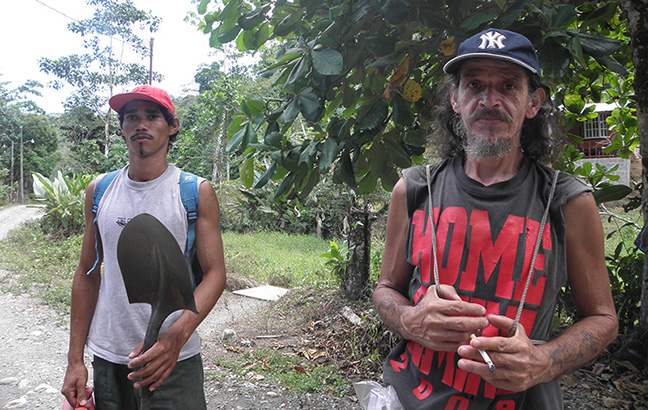
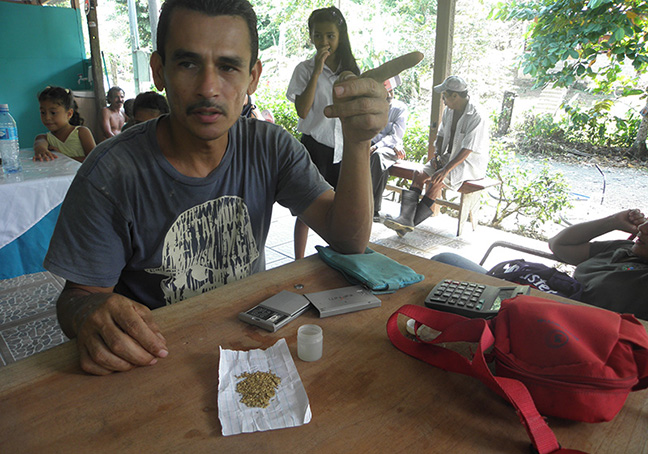
At 11am the next day we take the collectivo back to Dos Brasos and find Kincho waiting for us in front of that general store with a big smile, a backpack and bandana to matched his blue hat, and big rubber boots, the kind that come up to the knee. We invite him to help us stock up and goes big with two frozen packages of chicken, a frozen box of sausages, a box of red wine, a big bag of rice, a few packs of peanuts, three cartons of cigarettes, and two bags of coffee. He says there's water at his camp so I grab a coke, throw Zephyr on my shoulders, and we set foot on that dusty, river-rock spotted road.
Kincho looks at his watch and announces, “It's 12:30. Three hours to go.”
I take a deep breath and walk at the end of our little line, behind my wife, as my kid leans forward and starts chewing on my left ear.

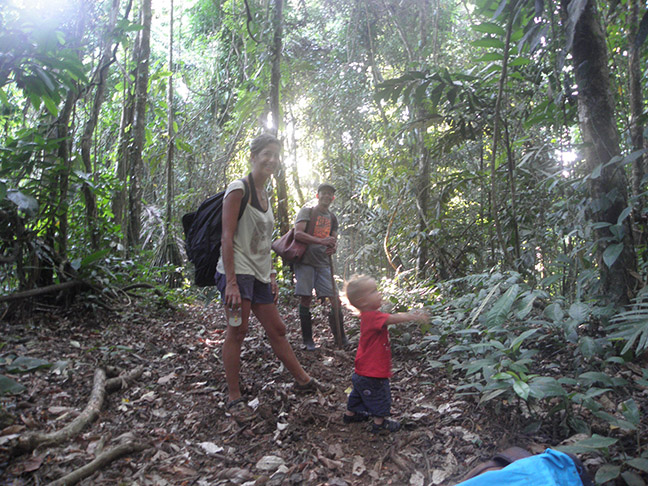
That was five hours ago. Now the light is starting to dim. I'm drenched in sweat. A bucket of water over my head would dry me off. We've walked up the Tiger River, ascended a ridge, joined another ridge which went more vertical than the last, turned right up a third that was more vertical and overgrown, and muddier, than the previous two until I found myself with one hand wrist-deep in the mud, balancing with Zephyr on my back, gasping like some whipped old nag. Between Zephyr's 25 pounds and my own 15 pound bag (most of it the accursed bag of rice) my knees are giving out.
Zephyr, small as he is, senses I'm near a limit. But he was cool as a little koala bear, hanging on to my ears, merrily rolling along, pointing out toucans or mimicking the lugubrious sound of the howler monkeys. He never cried, never got fussy, and I think it is because we include him in these stupid adventures that are quite interesting if all you have to do is sit on your father's shoulders. No, he did get fussy once, because we forgot to feed him, and after that he fell asleep.
“This is interesting!” Kincho yells from the front of our little line. “Look!”
Kincho points out a tree with leaves or something, then stops walking and tells us of his love for animals, for the mountains, of his love for the freedom of being a gold miner, of the sense of independence, joy, solitude, and independence. He sings a song of free-n-easy. And I think he sings that song a little too loud. But as he says these things he merrily, like some crazy elf, starts walking again and hops over a rock, slices a vine with his machete, points out more animal tracks and eats a banana that happens to be within machete's reach. He's surely at home and I surely am not.
Finally we descend into the river valley.
At Campesito Piedras Blancas (White Rocks Camp), on the opposite riverbank, a makeshift house is propped up under a green canopy of fronds, vines and leaves. I'd been biting the invisible chili pepper of endurance, trying not to whimper or think of my new blisters, aching back, bug bites and cut shins, and so I'm glad to see the walk coming to its end. A radio plays loudly enough to hear on the other side of the stream. A man, dressed in shorts, no shirt, and the same boots as Kincho, walks out of the tent to greet us. His broad face, fluffy hair, and dark complexion give him a look of a Latino Bilbo Baggins. His name's Lalo.
Lalo and Kincho had dug up some good luck the week before. They'd found a small wealth of pepitas, or gold chunks, and they headed to town to spend their findings on new cellphones the following day. These are their first phones. They giggle and start fondling their devices together while I sit down on a large rock to rest my legs. I consider throwing up.
Lalo turns down the radio.
“Does yours have a camera?” Lalo asks Kincho.
“Oh yeah, here.” He turns the phone over. “But I don't know how it works.”
Zephyr walks into the stream, stumbles, and falls on his face. I pick him up and nearly fall over, as well, my reason being a ferociously heavy headrush but before I can sit back down we're moving again. This time to visit another neighbor named Russo.
Russo, like Kincho, has lived in the camp for forty years. He has three pigs, three large dogs, six puppies, a couple dozen chickens, and between his house and Kincho's is a banana plantation of about an acre. His pigs roam the acre poking their noses into everything. Like Lalo, Russo lives between four vertical boards that supports a single sheet of industrial black plastic. The floor is dirt, the shelves are scrap boards, all is held together with twine. It smells as fresh as a pair of plumber's underwear. Russo's 72 years old and has cellophane skin that clings to his big bones. And he could kick my ass in a fistfight. All the miners have the same rough hands, the same soft demeanor, the same gentle respect for others. They all have pseudonyms like Russo, Lalo or Kincho, Plastic Frog (“Rana Plastico”), the Beast, Big Gut.
But there's something profoundly wrong about Russo. Russo sings the same song as Kincho, that free-n-easy jungle livin' tune. They like The Life. But what's wrong about Russo is what's wrong about Kincho. Why would anyone spend forty goddam years of their life in a place as remote as Tartarus' own outhouse, and at the tenderized age of seventy-two, walk hours through land so steep that a mis-step will cost you a femur? Nobody, at 72, wants to spend decades humping heavy rocks and digging in the mud. Nobody.
Of course it has to be the gold, but don't you either strike it rich of give up?
But before I could dig any deeper, Kincho announces it's time to go. He gives Russo a carton of cigarettes and one of those frozen chickens and we turn to walk the final steps to Kincho's ranchito.
It's the same as the others: dirt floor, no walls, black plastic roof, kettles and pans seared black, and a bed that's a few feet off the ground (presumably to provide easy passage for snakes, pumas, spiders and Russo's pigs). Kincho shows us a rough-built cabinet he'd made out of chainsawed tree bark.
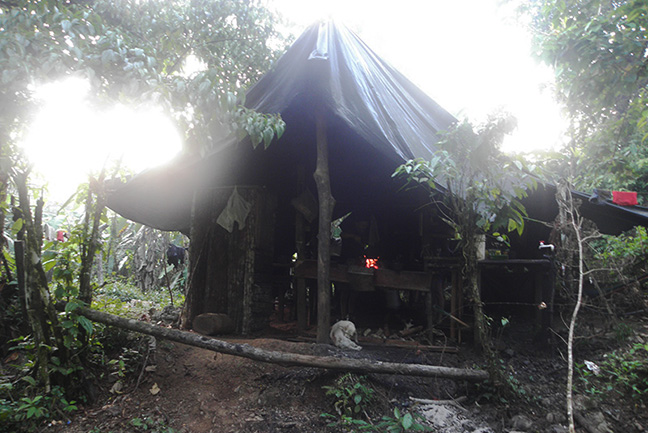
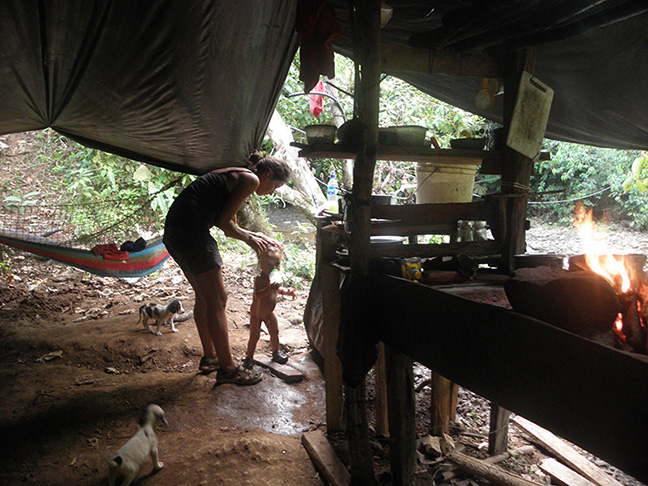
By sunset we'd eaten a hearty meal of rice and chicharone (Chicharone is fried pig skin. Russo killed one of his pigs a couple weeks ago). We'd washed it down with that box of red wine. Then we pulled out the hammocks and crashed. Drunk from sweating all day, I fell immediately asleep as if I'd had a barrel of wine, not a box. After two hours I woke up because my feet were cold. I'd forgotten to bring a blanket. We never use blankets on the boat; it's just too hot at nights. I looked at my watch, which told me I had seven hours to go before warm dawn would come. I wrapped a t-shirt around my legs and stuck my feet in my bag, which would have been fine if I hadn't woken up for each half-hour following. Hammocks are not as comfortable as they appear.
The dawn, eventually, thankfully, arrived.
I open my eyes and four puppies watch an iguana the size of my leg eat pieces of rice off the floor. I don't want to get out of bed, but it's a better alternative than laying here cold and tired. A spider crawls out of my shoe and runs towards Kincho who's busy starting a fire for coffee. At least there is coffee.
Gold mining, as Kincho showed us, is a knee-breaking, back-torquing, mind-numbing process that amounts to one simple action: sorting the riverbed. A miner lifts out the largest rocks and throws them to the side Then he piles a bunch of mud into a pan and starts to swirl it around to isolate the gold. The basic idea is that gold will fall to the bottom of the pan. Gold has a specific gravity that's almost twice that of lead, for example, so if you take a pan full of lead marbles, and stir it, the gold will precipitate, or fall to the bottom of the pan. You then rinse out the lead and go home rich.
Kincho's got a pan full of mud which he submerges into the river. He massages the contents, lifts the pan out of the water, plucks out the larger rocks, then puts the pan back in the water and sloshes. This is our fifth attempt.
A family of blond-faced Capuchin Monkeys do their own sorting in the green canopy above and the air smells like flowers and rain.
“Ahah. Here's some,” Kincho says.
He pushes his index finger into a thin wash of silt. I have to stare at it, and stare at it , then I see it a gold speck about as big as a half a spider's turd. There's no way I would have seen that.
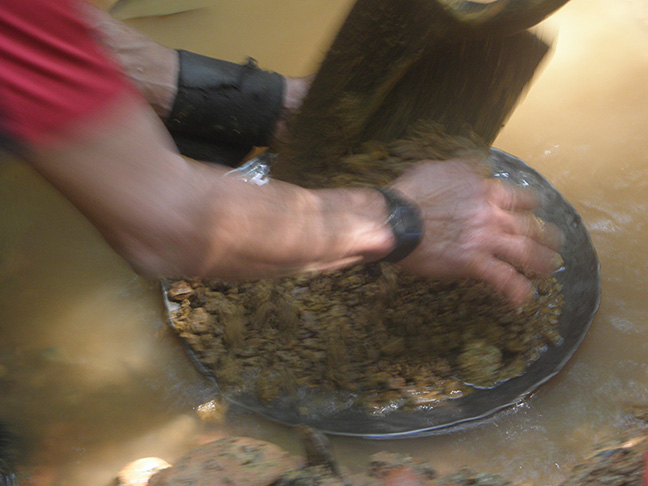
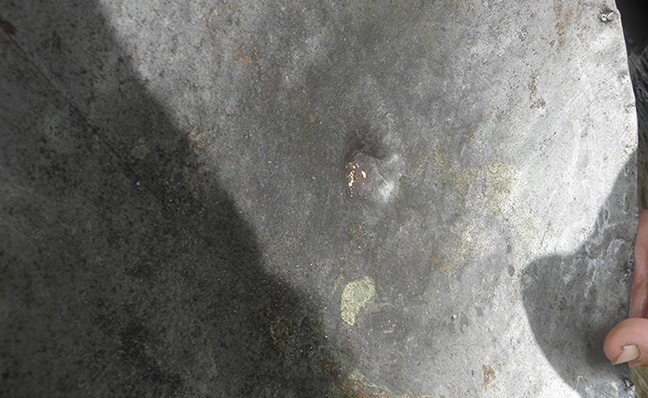
Kincho shrugs and washes off the pan in the water. The supernova speck returns to the stream.
He stands up and taps the dripping pan on his knee a couple of times.
“Theres not as much gold here now. Twenty or thirty years ago people were pulling up pepitas as big as chicken eggs. If the rains come and the water is high you could walk along the banks and pick pepitas off the ground.” He raises his hand and makes a pinching sign, showing me the size. His face contorts into a monstrous expression, his lips seem fat and greasy, pulled back and his teeth, black and yellow, held together with a couple of wires, seem to be nibbling on some invisible gum. He kind of hisses at me. Or maybe it was a sigh. Then this face fades and his kind bright eyes reappear and he smiles sweetly then turns, and waves his hand towards a small ravine.
“Let's go look here. There's lots of gold up here.” He splashes up the river ahead of us.
“Mucho, mucho,” he mumbles.
With Zephyr on my shoulders and Amélie right behind me I follow Kincho a step then he stops and squats down to pick something up.
“Look!” he squeals, and we all lean around him to see.
He has his finger out again, as he did in the gold pan. He's touching an indentation in the mud.
“A tapir! It walked here yesterday!”
The footprint is as big as Amélie's hand, looks like a pig's print, with a couple more toes. And baby footprints, next to it. Kincho holds his old chin a little higher and sets off walking again.
We didn't find gold in that river, but Kincho found a treasure, nonetheless.
Kincho's stories of working with other gold miners never had a happy ending. One guy stole gold, another guy stole tools, another guy wanted more than his 50%, and so for the last three decades Kincho's been working alone. It's common. Gold fever makes people sick.
A friend of ours that has lived in the Osa for 50 years, Patrick Jay O'Connell (also famously known as “The Gold Walker,” and who has written books about his life here) told us a story about a guy he worked with that during the day would secretly eat the pepitas of gold, saving them for later. Patrick noticed, one night after dinner, that this guy had taken the bucket they were doing dishes in down the the river, and then took a shit in it. Then this mysterious fellow would dig up his offal, pan for his gold a second time, and pocket the good stuff while the rest of the crew slept.
These rivers have seen stranger sights.
We stop for a sip of water. The trees overhead block out most of the direct sunlight, shooting veridian spotlights between the leaves. We are in a forest-room full of shifting green and yellow drapes. Kincho turns and points.
“Here,” he says, and he indicates the front of a tunnel – a mine shaft. If I didn't know that these hills were crawling with miners I'd have thought it was an industrious bear or a retarded dwarf that had made this thing. About waist-high it's set into a slight hill. Laying around outside is a shovel, an old plastic jug with a rope tied to it, and a bunch of cigarette butts and plastic bags. There's a large sheet of black plastic, probably the leftover from someone's tent.
Kincho, produces a headlamp from his bag, murmers to himself, and disappears into the tunnel.
I turn to Amélie and reassure her I'm not going in there. No. Fucking. Way. I hate small spaces. I shovel out a basin in the river we can pan in when Kincho comes out.
We can hear him inside the hill, saying things. But only individual words like, “Very good” and “consistency” bounce out.
Amelie, Zephyr and I sit on the ground outside, wait for Kincho and look at each other. Zephyr farts and drools, all the while keeping eye contact and a straight face. Amélie goes over to the stream for another drink.
Kincho reappears, the bucket full of mud.
“This is good, precious mud. There's gold in here. There's gold in here!”
Kincho hunches over the stream and starts to hungrily massage the mud.
“We'll find it!” he hisses like Gollum, “We'll find it!”
But we find nothing other than mud, worthless gravel, and a piece of noteworthy quartz. An hour passes, and we repeat this six times, but still no gold. Kincho begins wringing his hands and looking over his shoulder in what seems a needy, suspicious fashion. Is he worried about park rangers? Other miners? Ghosts? Frodo?
After an hour of watching both my curiosity and his repeated exits from the tunnel reassure me it would be okay to go take a look. I take the headlamp from Kincho and crawl in on all fours. After living on a boat for nearly a decade I may assure you I like small spaces as much as having my fingernails pulled out, but, for the sake of seeing, I crawl a good thirty feet back and pause at a Y in the tunnel. To the right I can see tiny glistening points of yellow. Bright yellow. The whole cavern, a dense rich, dark dirt, seems flecked and stuffed with thousands of points of gold. My eyes widen and mouth drops open and I think, We're rich! then I realize that they're droplets of water. To the left I see a piece of earth about as big as an apple fall and break on the floor of the tunnel.
It didn't take me long to get out.
We hike back down the stream, and find deer tracks, a large cat that was evidently following it, and some peccary tracks, wild pigs that Kincho calls, “chancho.”
With just a few hours left in the day, back at Kincho's house, we break out the sluice, shovel rocks and mud into it, let the river sort it, dump in more rocks and mud and finally take the assembly apart, sort it by pan, and we manage to collect the day's gold at the eleventh hour of the day. We get about enough lumps and dust that it might be as big as a housefly. Kincho pulls out a bottle with a squirt nozzle (a “chupacabra”) and sucks up the gold.
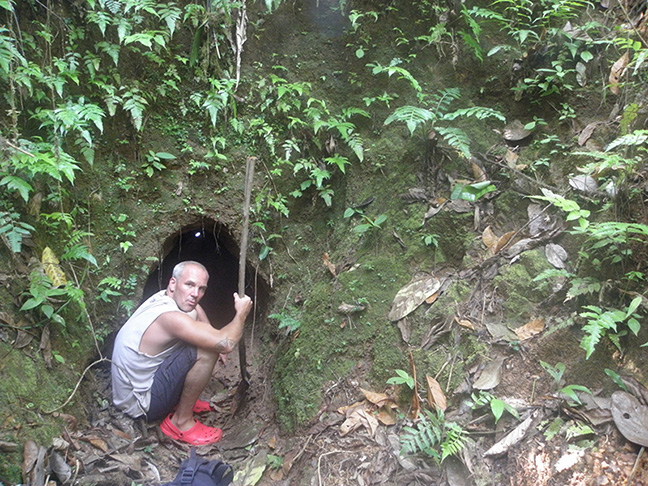
Dinner is again chicharone, this time with chocolate milk and friend bananas. For dessert we have Pall Mall cigarettes and water. It's still light out, maybe five o'clock. The puppies fumble around our feet, spreading ticks and chiggers all over us, and a monkey bellows in the forest. Kincho tells us about how uneducated the miners are, but not him. He's been to Panama and Colombia and he knows how to read.
“Russo thinks that there's only three continents,” he laughs.
“How many continents are there?” I ask. At first I am laughing at Russo, then I realize I'm not entirely sure myself. Does the Arctic count?
“Five,” says Kincho.
“And Europe's one of them, right?”
“It's in the middle of the Pacific, west of here. But it's an island.”
I wave a fly from my face and realize that I definitely do not know how many continents there are, but I'm sure Europe is not an island in the Pacific. My French wife assures me of such.
She was in the middle of changing Zephyr's diaper and asks, “Where do I throw this?” holding up the cute little plastic bag of shit.
“Right there,” Kincho says and points to a hole that some pigs are snuffing around in. The hole has various few plastic bags, some leftover food, and another diaper which, I realize, Kincho had already thrown in there. Amelie reluctantly tosses it into the hole, onto the pile, and we trade a funny face to say, “That's fucked up, but okay.”
Kincho takes a sip of chocolate milk, makes a hissing sound, then pulls a bug out of his mouth. He throws it on the ground. Then he goes and gets the little squirt-bottle, the chupacabra.
Pulling out the day's earnings he dries the water off on a piece of paper then, like a cocaine dealer, dries it again next to the candle, inspects it with a toothpick, wraps it in a small piece of paper, and folds it into a tight triangle. Let us remember that this substance is illegal, so it makes some sense he treats it like a narcotic. Then (in a tip cocaine dealers would be wise to learn) he removes the plastic wrapping from his pack of cigarettes, twists it, and uses the candle to heat the twist so it melts shut, sealing the gold inside the little packet inside the little plastic pocket.
He looks at me, smiles, holds the plastic up and says, “An old miner taught me that.”
He gives it to us as a souvenir.
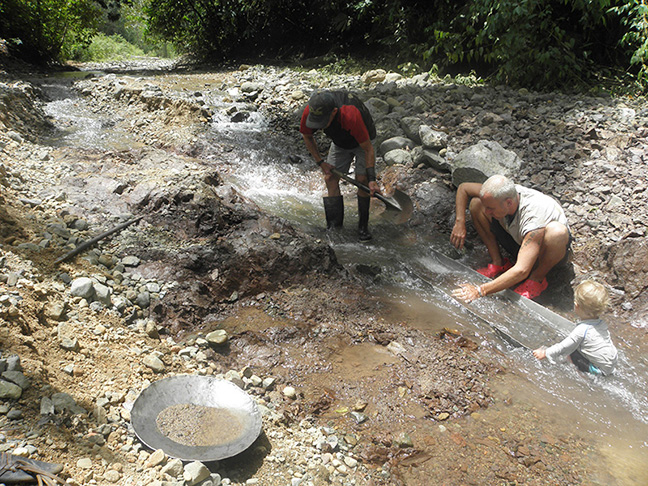
The eco-lodges might learn a thing or two about how to live by visiting Kincho. Though he threw a lot of rocks around he seemed to produce a small carbon footprint and change the jungle riverbeds very little. These artisanal miners move rocks from one side of the river to the other, dig holes in a hill (which collapse) and that's it.
Plastic is the main pollutant. As we leave for the morning walk up a hill Kincho is animated, talking about how hard the miners work, how difficult their life is, how they respect the environment and love it. He spends dramatic energies to explain that they don't use chemicals such as mercury and cyanide. They do it all by hand, pan, shovels, and lots of waiting.
“So no mercury?” Amelie confirms.
“That stuff's poison. Who wants to work with poison?”
Compared to the Gringo eco-tourists, the miners are eco-saints. The plastic the miners throw into the forest is ugly, but if the carbon footprint of plastic (LDPE / PET, polyethylene, etc) is about a kilo of C02 emissions per six kilos of plastic, and they use, say, 50 kilos a year (that's a lot of plastic, by the way), spewing out eight or nine kilos of C02 per year, then their carbon footprint is equal to flying in a jet about 200 miles.1
So any North American that flies to Costa Rica to visit the jungle, and then flies right back, is spewing about as much C02 on that trip as Kincho has in his forty years in that same jungle.
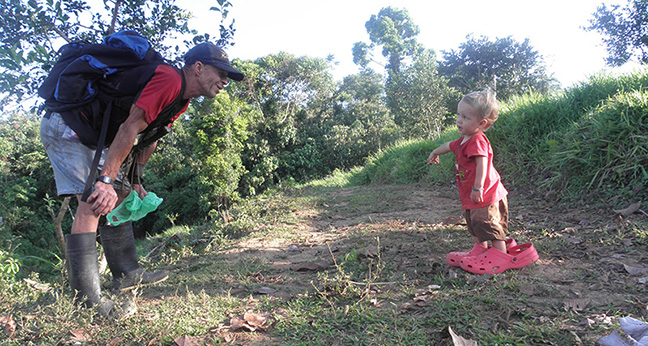
PART TWO: A SMALL PILE OF PINK CORPSES.
The chicharones we ate that night for dinner were organic, free-range and grass-fed. Carbon Footprint, Organic, Free Range and Eco-Whatever are all alien notions to red-neck campesiños like Kincho. They're post-industrial ideas exported by post-industrial people that grew up eating factory pigs plugged into matrix-like spigots, pumped plump with enough drugs to keep a London junkie numb. Industrialized countries create industrial products, like industrial pig. They also create post-industrial values, like carbon footprints, pollution, and organic food. None of it makes sense to Kincho. He doesn't want to go do yoga in an all-natural bamboo eco-lodge. And he couldn't afford it even if he did.
Gringos2 are changing the peninsula.
Consider the story of Tortuguero. This town, on the Atlantic / Caribbean coast of Costa Rica was, up until 1994 or so, a pretty relaxed community that took care of itself with fishing and agriculture. South of town the Tortuguero National Park was set up to give a helping hand to sea turtles, insects, birds, monkeys, and other such folk. It seemed a pretty good deal as tourists got to visit with the reptiles, the critters got a helping hand, and some locals made some money; classic national park business model. Fishing was still legal, but it was discouraged, and so local fishermen with entrepreneurial inclinations opened soul food restaurants of fish, poultry, and Tico food. The money that was spent by native tourists went back into the neighborhood economy. Ok, so far so good.
And then El Gringo sets foot in paradise. Things started getting wonky when two big, foreign-owned hotels appeared on the edge of the park. This brought in some work for the locals, didn't change the scene much for the local businesses, and, it turns out, really messed with the turtles the park was named after. The hotel lights, brighter than the ocean, screwed up the baby turtle's instinct to follow the lights. The little beasts all ran the wrong direction and the population took a substantial hit. So while it is safe to say the turtle moms hated it, the Gringo scientists loved it. They preceded the Gringo tourists, who also loved it, and soon the native-based tourism tapered off. This is because the cost of living jacked up to the point that locals couldn't buy food at the local grocery store. Not fancy stuff, but daily bread, gallo-pinto, and Coca-Cola. When parks raise their fees, locals can't pay for entrance to their own national park. Most Costa Ricans only get to see their own parks on field trips, when they're schoolkids. There's private parks, but some of those are $75 a day. Screw that. I don't like walking through this jungle, so paying $75 to do so sounds lobotomized.
Anyway everything went up in cost; gas, etc. Of course those local folks weren't picking up jobs at the hotels, either, since they didn't, say, speak English or know how to run an excel spreadsheet and so they got what manual labor gigs there were, if they got anything. Fishing or growing bananas became illegal and then, sometime around 2000, when Costa Rican government policies (as in Mexico and Nicaragua) started favoring the large resorts instead of the small businesses (of usual course), the local entrepreneurs weren't able to get loans to start tiendas and pulperias and such.
And so work, commerce, and most importantly, costs were all centered around this Gringo economy. Economic climate change snaps off a social ice shelf. Gringos retreat into enclaves like Los Sueños, in Herradura. That place has yachts with helicopters sitting on them. Within pissing distance from slums in the jungle. The big hotels started reproducing condominium-babies that entice more Gringos who spread through the land to set up shop on their own in the countryside.
It's a natural evolution. It's paradise, it's cheap, and Americans such as myself like it because you can buy land, build a dream, and go homestead. It's the American Way. Set up your ranch, your laws, your land. Set up a little plot, grow a little eco-food, help out the local community, save the eco-animals, keep the soil eco-healthy, and shoot the brains out of any mutherfucker that sets foot on it. Especially poachers, gold miners, or loggers.
Setting up a private paradise is what our good friend Raymond did.
Raymond, a 6'2” Gringo hippie of a grizzlyman, bought a beach-side valley in 1987, near N8º39.31, W83º15.41. He's been living in the jungle ever since. Raymond lives in a small wood house on stilts, has a fifteen-foot long pet crocodile named Dennis, and grows ayahuasca in his back yard. He also grows papaya, coconuts, bananas, limes, chickens, turkeys, and horses. A flock of McCaw parrots constantly make a horrible racket. Ant-eaters, coatls, and jaguars use his yard as much as he does.
He and his wife, Amy, got into birthing with dolphins. That's like swimming with dolphins, only you're unraveling an umbilical cord from the infant's neck, and bloodying the water with a placenta, while trying to keep your balance on a rocking boat. And for years Raymond has shown people how to swim and talk with these animals, to communicate between species, via his company Dolphin Quest. When he's not taking tourists out to commune with dolphins he's a foreman of a dive crew on boat transport tankers, over at the shipyards. He's flexibly-minded, able-backed, smart as a pepita of gold, and like any shaman with a deep bag of tricks, can take you places you've never imagined.
Raymond is meta-eco-tour. He's so eco-tour that he puts you in the food chain. He made the ultimate sacrifice all expatriots eventually make; they ditch their identity. I've heard that Ticos say that Raymond lives more Tico than most Ticos. I can testify that he eats a lot of gallo pinto and fish, is fluent in Spanish, and likes having kids run around the kitchen. In these ways he's Tico.
Raymond solves problems the way most campesiños do; with warm coffee and a large calibre weapon. If people are hunting on his land (which is adjacent to Piedras Blancas National Park) then Raymond fires his .357 magnum into the air a few times and folks usually get the message. After all, Raymond's got a small reserve of big animals that he's collected over the years. But if folks are illegally fishing in his bay he brews some coffee, slices up some sweet bread, and paddles on out in his kayak for a hello. After a little coffee folks bring their hooks up.
After spending almost a week with Raymond we were, ourselves, getting ready to pull anchor and head back to Jimenez. Raymond was showing us his horses and talking about the horse tours.
He always interrupts himself.
“Hey, you guys want some bananas to take along?”
Only someone on a hunger-fast would say no to fresh forest bananas, so Raymond asks José, one of his workers, to go machete off some bananas. I'd imagined a few bananas, but José comes back with a branch as big as my son.
“How about some limes? Oranges?”
Soon our shirts were full, and we're waddling back towards his house.
“How about a chicken?”
Raymond spans many worlds. He had become a Tico and set up his paradise.
Setting up a private paradise is also what Kimberly Ann Backwell did. Or tried to do, anyway, until she got herself killed.
Back in the late 90s she set up a homestead over near Jimenez, bordering the park where most of the gold runners were picking up gold from the camps and transporting it across to the sellers in Jimenez. The land Kimberly bought was pretty good turf. It had a road, a well, wild bananas and mangoes, and there were a bunch of wild cacao plants, too. So to complement her self-sufficient paradise, she set up an eco-chocolate business. Her love for animals, for the mountains, and her love for the freedom of being a homesteader were realized.
After a few years there, and being a woman from an industrialized culture like Canada, she took it on herself to educate girls on birth control, and gave local women work, helping produce chocolate. Raymond mentioned that she'd told him, “I'd rather pay the women so the men don't spend it all on guaro.” This was her first effort to change the Tico culture. I think it was her first mistake, as well. Even if I don't think its right I don't enter someone's house and then tell them how to act.
But Kimberly made a pretty mean chocolate. It was so good that it generated rumors around town that it was laced with some kind of magic joojoo. Between that, her bony face, aqualine nose, and big black hair the locals eventually dubbed her “La Bruja” (The Witch).
With a chocolate house and a little forest footpath one may imagine, quietly crossing her property, Hansel and Gretel. But instead, quietly crossing her property, were the miners, the hunters, and the loggers. The trail was very much like the one we walked to Kincho's camp. It had been used for generations by the campesiños as a trail in and out of the Osa.
Shortly after Kimberly moved in she adopted a small zoo of animals; a baby sloth, a few crocodiles, and a herd of forest pigs called chanchitos. Some of these animals, like ocelots and white-lipped peccaries, were species on the low-hanging end of extinction. But since the land had just recently been bought, and since people had been hunting those animals for generations (indigenous peoples get hungry, too), her zoo, or notion of private property, didn't make sense to the locals. The neighborhood path was used to go get things like meat, fruit, water, and gold.
But from Kimberly's perspective poachers and banditos were shooting animals on her land and stealing her property and it was her job to clean this up.
It's like the wild west out here. You have to fight for what you want. In buying the land there was no title, so she didn't pay for the entire property until the title was completed. In local terms it is not uncommon for land to change hands without a contract. But to Kimberly the Canadian the contract counted. So it seems, both from the first owner and her perspective, the land was not 100% hers. Mostly, but not 100%. But she defended it as if it were and got into a few yelling matches with the previous owner, with the hunters passing through, and would visit the homes of families to talk with the men, explaining why what they were doing was wrong or right.
Between the property dispute, her post-industrial feminist values, her eco-ideals, and her “strong” approach, she didn't get along too well with the neighbors.
Then, at the end of January, of 2011, Kimberly shot a fellow that she claimed was a poacher. She shot him with a BB gun then told Raymond about it the following day. Raymond offered to go over to help keep an eye on things. She said she'd be fine. But, let's face it; every North American knows that you don't shoot someone with a BB-gun.
Four days later a couple of park officials that were stopping through for some chocolate and coffee found Kimberly dead in her home, a bullet through her head. She'd been beaten before she was shot, said the hospital, so they put her body on ice for the coroner, and called for an investigation. But when something bad happens, and nobody wants to know about it, small towns have a serpentine way of moving even more slowly than their usual sleepy pace. The coroner had a birthday, then a vacation, then someone lost a key, and some secretary forgot a number, and by the time the coroner was finally goaded into doing his job the corpse was degraded enough that he couldn't do a worthwhile autopsy.
About a week had passed and Kimberly's friends and family buried her then went to clean up her ranch. They found the former owner there. He had moved in and was living in the house, with his kids, and their toys, and blood still on the floor. There were other kids from the village, and some of her stuff had already been sold, used, or thrown out (some of it would show up later, as I'll get to in a second).
Kimberly wasn't the only person to get the boot. Other North Americans with similarly “strong” opinions met mysterious endings over the last few years.
Kelly Robert Nutting, 38, had his hands tied behind his back and was dumped into the gulf with a concrete block for a life preserver.
The last time anyone saw Kim Paris was August 26, 2010 when she left the Latitude 10 eco-lodge beach resort on her bicycle.
There were the two Austrians, Horst Hauser, 68, and Herbert Langmeier, 66, that were shot in Dos Brasos, and then their bodies carted off, just up the road from where we met Kincho.
And Lisa Artz, the resident manager of Casa Tres Palmas, an eco-lodge near the park, was found dead July 20, that same year. Artz' death was linked to Kimberly's when some electronics appliances from Kimberly's home appeared in the home of some of the Artz suspects. Artz, also, was known to have had a rather radical eco-approach to changing the local culture and saw the killing of animals of any type as a crime.
Kimberly (and Lisa Artz, and many others that come to Costa Rica) arrived in Costa Rica and wanted to, in some small way, make a difference. They wanted to improve the world, make it a little better. But their neighbors weren't into it and this caused a social snag. Culture's a great social machine of cogs that fit together, people working together, spinning in a complicated symphony. But if the social gears get stuck then a little blood seems to help lubricate things.
Eventually the Canadian detectives came down, sniffed around, rattled the cages over at the Juzgado Penal de Golfito, and a couple of people have been accused, busted, imprisoned, then quickly released. The felons were treated as misdemeanors.
But the misdemeanor, or whatever demeanor isn't working, is El Gringo's. Not according to the law, but according to the culture, history, and majority rule. It is a questions of cultural compatibility.
In the end the rule of culture is stronger than the rule of law.
CONCLUSION: THE GOLDEN CALF.
We left Kincho's camp yesterday. It's sunset. We're sitting with Kincho on our sailboat, the Blue Goose. Amelie is picking ticks off of her legs then flicking the ticks overboard. The gentle rocking of the boat and the soft breeze has me swearing I will never, ever hike in the jungle again.
We invited Kincho for a sleepover to thank him for his hospitality. He'd never been on a sailboat before, had never seen a map of the world, and our iPad gave him a wide eye, as well. Trading world views and having fun together had become our local culture.
We down dinner and another box of vino tinto, and Kincho gets riled up again.
“Costa Rica's president, Chinchilla, is pushing people to become thieves. These laws against the gold miners, loggers, and farmers, the people who are living around the parks, are bad. She's taking from them the only work they know how to do. They're uneducated mountain people. They never learned anything other than looking for gold and buying guaro. In cutting their work she is pushing them to lead illegal, violent lives.”
I don't buy this victim talk. First, Chinchilla is listening to the sweet song of the Gringo dollar. Eco-tourism is a more sustainable commerce and a better long-term strategy than carting wood and metal out of the jungle. Second, and more important, the gold miners, loggers, and hunters of the Osa peninsula all know the same stuff the tour guides know; which snakes are poisonous, how long iguanas stay under water, where tapirs sleep. They all know the circulation and heartbeat of the jungle. The campesiños are knowledge workers. They live or die by what they can find. Kincho was at least as good at finding baby tapir tracks as he was at finding gold (if not better). If Kincho could find a tapir track he could find work as a tour guide, and probably more easily than he finds gold. He'd have to put on some bright, faggy clothes, show up for work on time, clock in, clock out, and say the same thing, again and again, to bovine-eyed herds of Gringos. He could find that.
But Kincho? No way. The problem is that Kincho would lose his identity. He was proud to be a Tico, a miner, and a mountain man. He was proud to be Kincho. Becoming an eco-guide would leave behind a history, a life, and a culture, regardless of the way he earned his money.
What's weird is that this is the same problem that Kimberly had. She didn't want to lose her identity, either. When she got to Costa Rica she found out what all expatriots discover: To be an expatriot is to be a suicide. Raymond picked this up quick, adapted, and has led a happy life in the jungle with the locals. But Kimberly wasn't about to adapt to the world around her. She was proud to be a conservationist, a feminist, and a Canadian. And since she didn't want to live like a Tico she created her own world, she built her enclave. It was like a bubble, or a life support system, that kept her identity intact. But both her enclave and her identity were in conflict with the bigger world of traditional Costa Rican camesiños.
Kimberly and Kincho both found themselves in a war of identity. Kincho, the Gollum of the mines, was addicted to his traditional life in the woods, and he wouldn't let go of that. Gold held real value for him. Kimberly, the famous witch of the woods, was addicted to her modern post-industrial values, values that were also precious, and she wouldn't let go of that.
Each of them wanted the world to adapt to them, and refused to adapt to the world around them. This sucks for them. Like a miner in a national park, a fish out of water, or a feminist in the forest, we have to sync with our environment or we fade, weaken, and die.
There's always been two ways to get into paradise: gold or tourism. Gold's the old school method. Everyone from old King Tut to Conquistador Cortez knew gold could buy you a front-row seat in the promised land. When you die you take the gold with you to pay for a guide who'll bring you into paradise. The new school method is tourism, or expatriating. Whether it's the Margaritavilles of Mexico, yaa baa in Bangkok, or Costa Rican eco-tours, you can find your version of paradise today. But like dying and crossing the river Styx, you still need a guide, and you're still going to need to pay him.
In the end paradise is a myth. When we go hunting for the treasures of the Osa we should remember this because perhaps, like paradise itself, we're just not made to live there.
Perhaps not even visit.
Next: on pirates and thieves just across the bay, in Golfito (and in which Raymundo makes another appearance) and onwards to Panama.
